Books I have read lately
Since last time, in no particular order. Warning: genre fiction. I get from mysteries what most people I know well get from bad TV or romance novels. And I’m trying to read a lot of memoir, for obvious reasons, so you may find that tedious as since Knausgård, whom I truly enjoy, everyone’s writing it. (I am starting to find it annoying as well — there’s an interesting essay on the personal essay here.) But there were some gems nonetheless, including two books I loved.
***
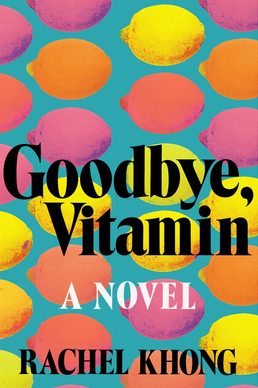 Rachel Khong, Goodbye Vitamin. A young woman moves home to help her mother deal with her (alcoholic) father, a history professor with accelerating Alzheimer’s disease. As his memories disintegrate, he shares with her his memories of her childhood via pages from a notebook. While watching him (and trying to cope with her mother’s non-coping), she gets involved in a weird scheme to make her think that he’s still teaching his classes, with a former teaching assistant who might be a good romantic partner. It’s probably obvious why I found this novel interesting, and it was heavily promoted in the literary press. It could have been excruciating, but this one lives up to the hype. It’s funny and sad but its brevity means that it allows us to focus long enough on a moment before darting away from it again. Highly recommended.
Rachel Khong, Goodbye Vitamin. A young woman moves home to help her mother deal with her (alcoholic) father, a history professor with accelerating Alzheimer’s disease. As his memories disintegrate, he shares with her his memories of her childhood via pages from a notebook. While watching him (and trying to cope with her mother’s non-coping), she gets involved in a weird scheme to make her think that he’s still teaching his classes, with a former teaching assistant who might be a good romantic partner. It’s probably obvious why I found this novel interesting, and it was heavily promoted in the literary press. It could have been excruciating, but this one lives up to the hype. It’s funny and sad but its brevity means that it allows us to focus long enough on a moment before darting away from it again. Highly recommended.
Anne Helen Petersen, Too Fat, Too Slutty, Too Loud. Essays on some of the prominent female cultural figures of our time, from Hilary Clinton to Kim Kardashian. Picked up because someone from UT told me that she had written her UT dissertation on the gossip industry. The essays are mostly about how these women navigate the assorted shoals created for them by public opinion and the gossip media, and it’s interesting, if not a must-read. What I most appreciated was the author’s willingness to look at them from counter-intuitive perspectives and particularly how they navigate the cultural rules around female excess. Kardashian is not someone I consider a woman to be admired, but I know many of my students last year did, and Petersen explains the rationale for thinking about her in this way.
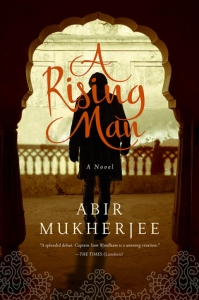 Abir Mukherjee, A Rising Man. Recommended by Herba. An English WWI veteran, now a policeman, is posted to Calcutta, only to encounter a murder on terrain completely unknown to him. Herba said that she was surprised by how much she liked this book and I agree with that assessment. Fairly conventional police procedural, albeit in a novel setting for me. What speaks for it: suggestion of a continuing plot line about the colonial government that will connecting it to upcoming books; a well-drawn sidekick in the form of Sergeant Banerjee, who mediates between the local and the English perspective; an interesting female character that one suspects will recur. Also interesting to me — the local perspective on historical events I’ve lectured about a fair amount, as well the fact that I did not predict the solution to the crime although I had to concede afterwards that the author left a glaring clue in plain sight. Will definitely be reading the next novel in the series when it appears.
Abir Mukherjee, A Rising Man. Recommended by Herba. An English WWI veteran, now a policeman, is posted to Calcutta, only to encounter a murder on terrain completely unknown to him. Herba said that she was surprised by how much she liked this book and I agree with that assessment. Fairly conventional police procedural, albeit in a novel setting for me. What speaks for it: suggestion of a continuing plot line about the colonial government that will connecting it to upcoming books; a well-drawn sidekick in the form of Sergeant Banerjee, who mediates between the local and the English perspective; an interesting female character that one suspects will recur. Also interesting to me — the local perspective on historical events I’ve lectured about a fair amount, as well the fact that I did not predict the solution to the crime although I had to concede afterwards that the author left a glaring clue in plain sight. Will definitely be reading the next novel in the series when it appears.
Ann Cleeves, Raven Black. First in a series of seven novels to date (I am currently reading the fourth). Inspector Jimmy Perez, native of Fair Isle, lives in Lerwick on the Main Island of Shetland and investigates crimes. I think I picked this one up because of something I saw on the BBC page. The structure of these books is a lot like that of Henning Mankell, with an extensive opening chapter ending with the crime, and I didn’t think it was executed so well in the first one (which won a big crime-writing award), but that book won me over with the subtlety of the plot. An island mystery is a variation on a country house mystery — every possible perpetrator has to figure in the story to make it plausible. Cleeves does a good job of balancing threads so that attention is directed away from the criminals to the very end; in Raven Black I only predicted half the ending and I enjoy that feeling of surprise. Another plus: the books are more about how the remoteness of the location and the claustrophobia of not being able to escape island history affect relationships, than about the exotic setting as such. I’m planning to finish the series.
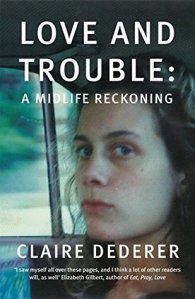 Claire Dederer, Love and Trouble. Memoir of a Gen Xer in middle age, sequel to an earlier book, Poser, which I have also read. Picked up because Dederer is the friend of a friend, and also because she’s considered an excellent memoirist, but I’m not sure why I finished either of them. Poser, which details her cohort’s pursuit of the twenty-something purity cult of yoga and organic life in Seattle, really alienated me. I was somewhat less peeved by this book, mostly because there’s a well-observed bit about the tendency of middle-aged women to cry at the drop of the hat, but I suspect that readers outside Dederer’s social class segment will find little relatable here.
Claire Dederer, Love and Trouble. Memoir of a Gen Xer in middle age, sequel to an earlier book, Poser, which I have also read. Picked up because Dederer is the friend of a friend, and also because she’s considered an excellent memoirist, but I’m not sure why I finished either of them. Poser, which details her cohort’s pursuit of the twenty-something purity cult of yoga and organic life in Seattle, really alienated me. I was somewhat less peeved by this book, mostly because there’s a well-observed bit about the tendency of middle-aged women to cry at the drop of the hat, but I suspect that readers outside Dederer’s social class segment will find little relatable here.
Chevy Stevens, Never Let You Go. Recommended by SueBC. A solid thriller about a woman whose violent ex-husband gets out of prison, with an interesting plot twist. I can see why her novels are popular: interesting main character, plenty of tension, and the ending wasn’t immediately obvious to me. Solid summer read.
Susie Steiner, Persons Unknown. Second in a series of police procedurals centered on Manon Brandshaw, a single female detective from Cambridgeshire with typical early-forties problems. Picked up because the library page told me, “If you like Kate Atkinson, you will like …” and I adore Atkinson’s mysteries. It’s not subtly plotted and there are three obtrusive, glaring clues early on. Answer to the puzzle hit me about p. 180. However, I kept reading because I really liked the characters and the problems in their relationships — especially those stemming from Manon’s adopted son, Fly. It reminded me a bit of how Elizabeth George was before she turned her books into doorstops. For some reason, the library didn’t suggest the first one, but I will be going back to it.
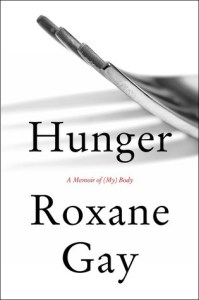 Roxane Gay, Hunger. Noted feminist’s memoir of being fat, much discussed in the feminist public sphere at the moment. Gay has a point-blank, merciless style that I admire — she starts off by noting that she is “super-morbidly” obese and that even most “body positive” people have no patience for her at about 450 lbs. I found this book somewhat uneven; it could equally have been a trauma memoir, and — this will sound cold — I found her discussions of her rape as a teenager problematically opaque. It’s like she elucidates an explanation and keeps pointing at it aggressively as an explanation, but then has nothing to say in specific about that issue that connects it to her current situation. She’s better at describing her feelings about her body than making their sources comprehensible to the reader. Still, there’s much to recognize and appreciate here.
Roxane Gay, Hunger. Noted feminist’s memoir of being fat, much discussed in the feminist public sphere at the moment. Gay has a point-blank, merciless style that I admire — she starts off by noting that she is “super-morbidly” obese and that even most “body positive” people have no patience for her at about 450 lbs. I found this book somewhat uneven; it could equally have been a trauma memoir, and — this will sound cold — I found her discussions of her rape as a teenager problematically opaque. It’s like she elucidates an explanation and keeps pointing at it aggressively as an explanation, but then has nothing to say in specific about that issue that connects it to her current situation. She’s better at describing her feelings about her body than making their sources comprehensible to the reader. Still, there’s much to recognize and appreciate here.
Amy Thielen, Give a Girl a Knife. The memoir I probably liked best this time around. Thielen grew up in a remote part of northern Minnesota, then moved, after her parents’ divorce took her to college near St Paul, into an even more remote part of Minnesota. After that she and her artist husband moved to NYC, where she apprenticed as a chef at several restaurants, before she got pregnant and they moved back to the even more part of Minnesota, where she became a television chef and a food writer. I find the chapters on her childhood eating, which start toward the middle of the book, a moving and insightful description of Upper Midwest food culture and I found myself nodding a lot as she described her relatives’ “sour gene” that made them love pickled things, or the excess with which her family cooked. I felt a sense of affinity to her — her perceptions, like mine, of loving both the city and the country, permeate the book.
 So I moved on to her recent cookbook, The New Midwestern Table, which I unfortunately found less convincing. On the one hand there are things in here (Braunschweiger spread, pickled fish) that I am glad to have documented as part of the Midwest culinary contribution, but other recipes transgress fundamental cultural rules for me (making deviled eggs out of pickled eggs, for example, or putting fresh basil and lemon in pickled fish. Or rhubarb sangria. WTF?). I guess I was hoping for something more like “the definitive Midwestern table.” I simply don’t believe her claim that she used only ingredients that she could always find in her local grocery store in her even more remote part of Minnesota, where her family has settled now. I also find her apparent frustration with seasonal eating maddening. Imagine that — you can’t buy fresh sweet corn out of season in most of the Midwest. Om, that’s because by the time it gets to us it tastes like shit. What makes the Midwestern table, arguably, and is reflected in many of her recipes, is its approach of using what’s available when it’s available, preserving what one can, and doing without the rest of the year. Okay, admittedly, I have a thing about sweet corn. But this is the Midwestern canon gussied up by a New York chef, and that saddened me.
So I moved on to her recent cookbook, The New Midwestern Table, which I unfortunately found less convincing. On the one hand there are things in here (Braunschweiger spread, pickled fish) that I am glad to have documented as part of the Midwest culinary contribution, but other recipes transgress fundamental cultural rules for me (making deviled eggs out of pickled eggs, for example, or putting fresh basil and lemon in pickled fish. Or rhubarb sangria. WTF?). I guess I was hoping for something more like “the definitive Midwestern table.” I simply don’t believe her claim that she used only ingredients that she could always find in her local grocery store in her even more remote part of Minnesota, where her family has settled now. I also find her apparent frustration with seasonal eating maddening. Imagine that — you can’t buy fresh sweet corn out of season in most of the Midwest. Om, that’s because by the time it gets to us it tastes like shit. What makes the Midwestern table, arguably, and is reflected in many of her recipes, is its approach of using what’s available when it’s available, preserving what one can, and doing without the rest of the year. Okay, admittedly, I have a thing about sweet corn. But this is the Midwestern canon gussied up by a New York chef, and that saddened me.
Matthew Klam, Who is Rich? A potentially has-been cartoonist struggles with infidelity while teaching at a summer art workshop. Picked up because I saw this reviewed positively in at least five places, and Klam is supposed to be a master of observation, which I’m interested in, and also because he was denied tenure. But in the end, a novel about male infidelity needs to be more interesting than this to hold my attention. I found myself sighing in impatience. Read half.
Patricia Lockwood, Priestdaddy. The daughter of a Catholic priest (her father was a Lutheran pastor who found his vocation after his marriage) and her husband move home with parents after a severe reversal of fortune. Hilarity ensues. Not for me, though, as I couldn’t get on Lockwood’s wave-length of absurdity. Returned to library after seventy pages.
 Emily Fridlund, The History of Wolves. Reading this because NBK is reading parts of the Man Booker long list. A girl whose parents lead materially difficult lives in the ruins of an abandoned 80s commune in a remote Minnesota forest babysits for the child of strangers who move into the cabin across the lake, a little boy with mysterious problems. Uneven. I appreciated the meticulous observation; I’m increasingly grateful for people who can describe this part of the world even adequately as I’ve read so many bad Minnesota and Wisconsin novels now. But the protagonist remains almost completely opaque to me. The literary press really likes this book — me, somewhat less, but I would definitely read another novel from this author.
Emily Fridlund, The History of Wolves. Reading this because NBK is reading parts of the Man Booker long list. A girl whose parents lead materially difficult lives in the ruins of an abandoned 80s commune in a remote Minnesota forest babysits for the child of strangers who move into the cabin across the lake, a little boy with mysterious problems. Uneven. I appreciated the meticulous observation; I’m increasingly grateful for people who can describe this part of the world even adequately as I’ve read so many bad Minnesota and Wisconsin novels now. But the protagonist remains almost completely opaque to me. The literary press really likes this book — me, somewhat less, but I would definitely read another novel from this author.
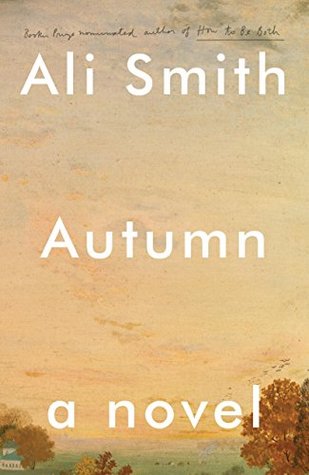 Ali Smith, Autumn. Also reading this because of NBK’s project. This has been described as a Brexit novel, and it is also that: the observations on the UK in the wake of the referendum are poetic and poignant and brutal. But more than that, like much of Hilary Mantel’s work, it’s a book about time passing. An elderly man fades away in a nursing home as a young girl he met forty years earlier, now a casual lecturer of art history, tries to apply for a passport; in turn, he remembers pieces of the Christine Keeler affair and she recollects her discovery of a female pop artist as her mother deals with antiques. It’s all very bare — there’s nothing superfluous anywhere in the prose or the plot, it’s poetic and gripping. OMG. I LOVED THIS. As in, I immediately put everything else she’s written into my library queue, which I hardly ever do.
Ali Smith, Autumn. Also reading this because of NBK’s project. This has been described as a Brexit novel, and it is also that: the observations on the UK in the wake of the referendum are poetic and poignant and brutal. But more than that, like much of Hilary Mantel’s work, it’s a book about time passing. An elderly man fades away in a nursing home as a young girl he met forty years earlier, now a casual lecturer of art history, tries to apply for a passport; in turn, he remembers pieces of the Christine Keeler affair and she recollects her discovery of a female pop artist as her mother deals with antiques. It’s all very bare — there’s nothing superfluous anywhere in the prose or the plot, it’s poetic and gripping. OMG. I LOVED THIS. As in, I immediately put everything else she’s written into my library queue, which I hardly ever do. EAT READ THIS RIGHT AWAY BEFORE IT GETS COLD.
Laurie Forest, The Black Witch. A coming-of-age fantasy novel in which a young girl with a heavy heritage and historical fate to bear leaves home for university and slowly learns to abandon her (species-ist) assumptions about her society, just as circumstances force her to throw herself in with all those she has been taught to fear. Picked up because there was a huge Twitter storm. Well, the discussion of the storm was way more interesting than the book itself. To me, the drama side-stepped the potential political problem with the book, which isn’t so much a question of cultural appropriation or racism in the narrative as it is the fact that the majority / superior culture kid always has a relatively safe space in which to figure out her political position that is not afforded to her minority / inferior culture counterpart. I can see why that is enraging and why novels like this could be hard to read from particular perspectives, but that difficulty isn’t taken on in the criticism of the novel that I’ve read. However, even worse: the novel’s just boring. I’ve read lots of good YA but this also-ran got way more attention than it deserved.
 Christopher Milne, The Enchanted Places. Published some time ago; first in a series of memoirs by the real-life “Christopher Robin,” A.A. Milne’s son. I grew up with Disney Pooh rather than book Pooh, but Milne’s books are quite popular in Germany and so I picked this up after reading cursorily about a new Milne exhibit at the V&A. Milne formulated the book as a response to the many letters he didn’t answer over the years from his father’s readers about what it was like to grow up as he did, and also a bit as a response to those who were angry that he grew impatient with the legacy of his father’s writing and became estranged from his family. The memoir is interesting and somewhat disjointed; it does a good job of accomplishing the former and not much toward explaining the latter. He wrote some books after this one, so perhaps he gets to it in one of them, but they are not in our county library system, so it’s going to take me a bit a of more creative borrowing to get my hands on them. To be praised: the book’s restrained, sometimes elliptical style.
Christopher Milne, The Enchanted Places. Published some time ago; first in a series of memoirs by the real-life “Christopher Robin,” A.A. Milne’s son. I grew up with Disney Pooh rather than book Pooh, but Milne’s books are quite popular in Germany and so I picked this up after reading cursorily about a new Milne exhibit at the V&A. Milne formulated the book as a response to the many letters he didn’t answer over the years from his father’s readers about what it was like to grow up as he did, and also a bit as a response to those who were angry that he grew impatient with the legacy of his father’s writing and became estranged from his family. The memoir is interesting and somewhat disjointed; it does a good job of accomplishing the former and not much toward explaining the latter. He wrote some books after this one, so perhaps he gets to it in one of them, but they are not in our county library system, so it’s going to take me a bit a of more creative borrowing to get my hands on them. To be praised: the book’s restrained, sometimes elliptical style.
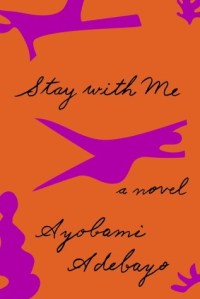 Ayobami Adebayo, Stay With Me. Picked up because NBK admired the audiobook, but in the interval my library page also told me to read it, probably because of my interest in Chimamanda Ngoza Adichie. In Lagos, Yejide and her husband are childless after four years of marriage. Their families intervene to find him a second wife and in response, Yejide does what she needs to do to get pregnant. First and foremost, this is a just plain good story, with a gripping plot. But secondly, I think that Adebayo understood something Klam missed: that in order to write about infidelity, one has to write about fidelity at a level beyond the logistical. Additionally, I am starting to love the directness of Nigerian women that I experience in these novels. Strongly recommended.
Ayobami Adebayo, Stay With Me. Picked up because NBK admired the audiobook, but in the interval my library page also told me to read it, probably because of my interest in Chimamanda Ngoza Adichie. In Lagos, Yejide and her husband are childless after four years of marriage. Their families intervene to find him a second wife and in response, Yejide does what she needs to do to get pregnant. First and foremost, this is a just plain good story, with a gripping plot. But secondly, I think that Adebayo understood something Klam missed: that in order to write about infidelity, one has to write about fidelity at a level beyond the logistical. Additionally, I am starting to love the directness of Nigerian women that I experience in these novels. Strongly recommended.
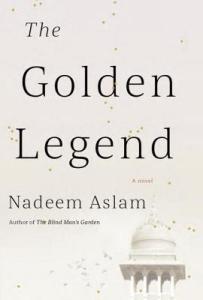 Nadeem Aslam, The Golden Legend. In the Pakistani city of Zamana, someone broadcasts a nightly accusation from a neighborhood mosque, revealing the secret sins of someone in the community. When Nargis’ husband, Massud, is killed in a riot, she is threatened with the revelation of her secret, which in turn will jeopardize the lives of the people around her. There’s so much in this novel — reflections on life in Pakistan, on past and present, on the U.S. influence, on Kashmir, on the matter of persecuted Christians. But what’s most important to me are the ways that the story draws on other stories we know, particularly stories about purity and diversity. I was reminded repeatedly of Nathan der Weise and Don Quijote but there are references to the Bible and the Koran, and Greek and Christian mythology (and no doubt many I didn’t recognize). Stumbled over it on the “New Fiction” shelf in the library. I adored Maps for Lost Lovers (2004), but I hadn’t been following his career since then. So this was an automatic pickup and it did not disappoint: it had the same characteristic mix of beauty and extreme suffering. I’ve meanwhile ordered his novels from the interval, which I’d missed.
Nadeem Aslam, The Golden Legend. In the Pakistani city of Zamana, someone broadcasts a nightly accusation from a neighborhood mosque, revealing the secret sins of someone in the community. When Nargis’ husband, Massud, is killed in a riot, she is threatened with the revelation of her secret, which in turn will jeopardize the lives of the people around her. There’s so much in this novel — reflections on life in Pakistan, on past and present, on the U.S. influence, on Kashmir, on the matter of persecuted Christians. But what’s most important to me are the ways that the story draws on other stories we know, particularly stories about purity and diversity. I was reminded repeatedly of Nathan der Weise and Don Quijote but there are references to the Bible and the Koran, and Greek and Christian mythology (and no doubt many I didn’t recognize). Stumbled over it on the “New Fiction” shelf in the library. I adored Maps for Lost Lovers (2004), but I hadn’t been following his career since then. So this was an automatic pickup and it did not disappoint: it had the same characteristic mix of beauty and extreme suffering. I’ve meanwhile ordered his novels from the interval, which I’d missed.
Jeffrey Kluger, Apollo 8. Kluger does for the first moon mission what he did for the Apollo 13 mission in Lost Moon two decades ago. A solid, well-written personal and technical history of the early Apollo missions, although without the moment-to-moment drama of the Apollo 13 story.
Eden Lapucki, Woman No. 17. A Hollywood woman with a book deadline, a non-verbal son, a toddler, and a fractured marriage hires a live-in babysitter in order to get herself writing. I don’t think I’ve ever read a book like this — a combination satire of motherhood and suburbia with development of tension like a noir movie. The levels of mirroring (mother who doesn’t want to be a mother; artist who is pretending to be a mother) are complex and full of absurdity. This book doesn’t have a lot of heart, but it’s got plenty of candor and style. I think I’d call it “smart” with all the ambivalence that raises for me.




Thank you, M. Enough info here to make informed decisions re: what to reserve for the first big snow of the year. Delicious – and so much variety.
LikeLike
defnitely some good stuff here.
LikeLike
Just a sort of aside. I’m sure you already know that the BBC series “Shetland” (which has been aired here) is based on Ann Cleeves books – including Raven Black – I think there are around 8 parts in all – and that Insp. Jimmy Perez is played by Douglas Henshall who was in This Years Love where Richard is referred to only as “Smug Man at Party”. Things have sure looked up for him since then. 🙂 The nice thing about the series for me is the amazing scenery. I visited the Shetland Islands while in college – many long years ago! I confess I haven’t read the books.
LikeLike
I did not realize that about “This Year’s Love”.
The BBC series might have been what made me stumble over the books. I haven’t seen the episodes, though the books make me want to visit all on their own.
LikeLike
I knew you would like Stay With Me 🙂 It’s high time I read some Chimamanda Ngoza Adichie. Agree with you on History of Wolves. I hope I get to write a review this afternoon.
LikeLike
In a way, the African novels I have read lately have recharged reading for me as an experience. I’ve enjoyed it forever, I wasn’t going to stop, but they have raised the excitement level. (Similar thing happened to me when I got good enough at Spanish and German to read novels in those languages — and I’d been wondering whether it was time for me to try another language.)
LikeLiked by 1 person
Yes, it’s great that Africa produces so many great women writers 🙂 I might go for Purple Hibiscus next.
LikeLike
I think that’s actually my favorite of hers.
This was recommended to me this week, so I put it in my library queue: http://kwani.org/publication/kwani-series/189/kintu.htm
LikeLiked by 1 person
That sounds interesting, adding it to my wishlist! Thanks for the tip!
LikeLike
Sounds like a really interesting bunch of books again!
Thanks for linking to my post. I’m glad you enjoyed “Never Let You Go”.
LikeLike
Definitely a solid thriller read!
LikeLiked by 1 person
I finished a book, one that Richard mentioned in an interview. The Master and Margarita, claimed to be the best Russian literary classic ever written. It was a challenge, I am not a scholar and found it difficult at times to continue but I am determine to read the classics from all different sources. I have started Charles Dickens’ David Copperfield, let you know when I’m done!
LikeLike
Wow, yeah — that is love. I like that book a lot but it’s definitely not the easiest thing to understand. Hope you like Copperfield! (it will be easier to read, for sure).
LikeLike
[…] last time. And since last time was late in September, this is going to be a long, but quick and dirty, list. […]
LikeLike
Books I have read lately | Me + Richard Armitage said this on December 30, 2017 at 7:48 am |
[…] Mukherjee, A Necessary Evil. Picked up after enjoying the first book in the series. Our hero, Sam Wyndham, along with sidekicks “Surrender-Not” (Surendranath Banerjee) […]
LikeLike
Books I have read lately (May 2018) | Me + Richard Armitage said this on May 31, 2018 at 5:07 am |